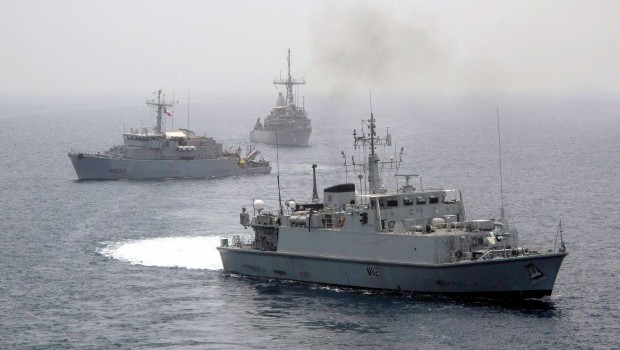
A US Navy handout photo shows ships breaking formation during the International Mine Countermeasures Exercise (IMCMEX) in May 2013. (AFP Photo/US Navy/MC2 Terah L. Mollise)
Kuwait City, Asharq Al-Awsat—The Gulf Cooperation Council (GCC) is mulling the establishment of a joint naval force as a precautionary step to protect the waters of the Gulf from potential terror threats, a senior Kuwaiti official said Wednesday.
The new marine force is intended to combat terror and protect the Gulf commercial routes in coordination with foreign navies, such as those from NATO, the state-owned Kuwait News Agency (KUNA) quoted an advisor at the Kuwaiti Ministry of Defense, Maj. Gen. Ahmed Al-Mulla, as saying on the sidelines of a maritime security conference in Qatar on Wednesday.
The force, to be named “Maritime Security Group 81,” will act as a maritime equivalent to the Peninsula Shield Force—a 40,000-strong force based in Saudi Arabia and tasked with the protection of GCC member states against military aggression—the official said.
Recent developments in the region have necessitated boosting security cooperation between GCC countries in a bid to deter potential terror threats and protect natural resources, a Gulf source, who spoke on the condition of anonymity, told Asharq Al-Awsat. The force is expected to be set up by the end of the year, the source maintained.
In comments to Asharq Al-Awsat, a senior scholar at the Bahrain Center for Strategic, International and Energy Studies, Dr. Ashraf Kishk, pointed to a link between the move and the growing Western and Arab airstrikes on terror positions in Iraq and Syria.
It is an example of a “long-term strategic vision as the increase in airstrikes on terror groups may prompt them to transfer their battle from the land to the sea and start targeting oil carriers [in Gulf waters],” Kishk said.
In 2002, an oil tanker was damaged by a ramming attack by a small boat loaded with explosives in the Gulf of Aden. The attack, for which Al-Qaeda claimed responsibility, followed a similar attack on a US Navy warship, the USS Cole, in a Yemeni harbor in October 2000.
The move, the strategist maintained, also reflects a growing international interest in preserving maritime security to clamp down on growing piracy-related activities.
“The presence of a GCC force will complement international efforts to preserve maritime security, particularly as the African side that overlooks the Red Sea and the Bab El-Mandeb strait has seen a growing presence of radical groups whose next step may be to cross into the Arabian Peninsula,” he said.
Dr. Kishk said the move was a positive development in terms of regional security, and that “the GCC countries have moved from the phase of realizing dangers to finding mechanisms for facing and handling them.”
Obeid Al-Suhaimi contributed additional reporting from Manama.

Trackbacks/Pingbacks